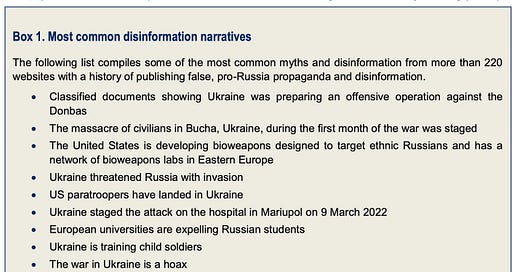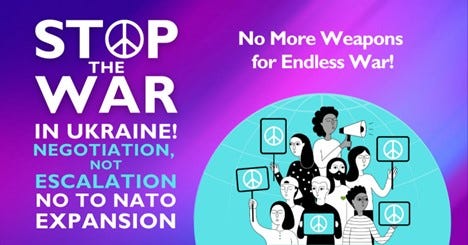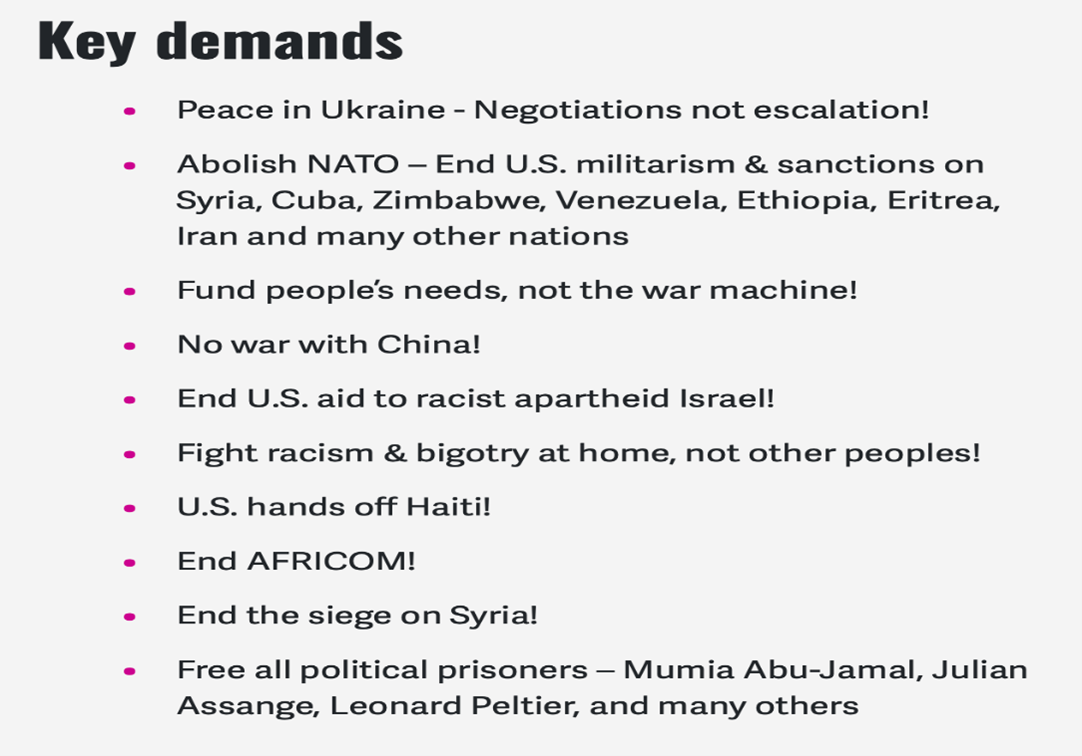What's So Funny About Peace for Ukraine?
Supporters of U.S./NATO rebuff of diplomacy need to engage seriously in a policy debate.
In a recent article for his Substack newsletter, Joe Cirincione outlines his view of why someone might disagree with the U.S.’ and NATO’s approach to Russia’s invasion of Ukraine and why he thinks they’re wrong. I have known Joe for years, and I know him to be a good and thoughtful person who is genuinely and passionately interested in peace, and has done more than most to promote it. I have great respect for him, even when I disagree with him. And I disagree with much in this article of his.
Joe’s framing of the question is problematic from the first. “If you think the West caused the war in Ukraine and wants ‘to bleed Russia dry,’ or that aiding Ukraine prolongs and escalates the war, or that we can get peace by insisting on a ceasefire and negotiating a compromise on the land Russia now occupies, then it might be good for you to consider why you think this,” he writes.
My own view
My own view of this war is outlined in this piece I wrote for Medium a few weeks ago. I do believe that it is both possible and important to recognize that the U.S. and NATO have made some very bad decisions over the years which helped bring us to where we are today and, at the same time, that those bad decisions don’t in any way justify Russia’s seizure of Ukrainian land, either in 2014 or last year. It is possible as well to say that the Biden administration did not try diplomacy (when they say they “talked” to Russia, they threatened and laid down red lines—that’s not diplomacy, it’s egging on) to avert this war or to end it, while at the same time acknowledging that Vladimir Putin has shown no interest in serious talks and that, even if the U.S. had tried, there is no guarantee it would have worked. There is also no guarantee it would have failed either.
None of my objections to the current policy are listed in Joe’s framing. For example, as I said, while I think there have been decades of bad Western policy toward Russia, dating back to the end of the Cold War, this does not mean the West “caused” this war. Russia did, with its illegal, brutal, and, yes, unwarranted invasion of Ukraine. While I do argue that Russia had legitimate concerns over NATO’s expansion, George W. Bush’s invitation for Ukraine to join NATO, access to the Black Sea, and a few other issues, these do not come anywhere near to justifying Russia’s actions.
Nor do I believe that aiding Ukraine “prolongs and escalates the war,” outside of the literal sense; obviously, aiding Ukraine prolongs the war in the sense that without the aid, Ukraine would surely have been conquered. It’s hard to see that as preferable, to say the least. But I argue that while there is no alternative to aiding Ukraine in its effort to defend itself, but that this does not and must not preclude diplomacy. Peace talks while fighting rages is the norm; holding them only during ceasefires is the exception. It is fundamentally misguided to believe that the fighting must stop for the talking to begin; it is the talking that ends the fighting. It’s not the aid that prolongs the war; it’s the refusal to talk. And even if that applies even more to Russia than to Ukraine and its NATO allies (a debatable but defensible position), that shouldn’t prevent the United States from exploring diplomatic alternatives. The high road, especially one which carries no cost, is something the Biden administration might want to try on for size.
I also do not advocate any negotiations involving territory. That is not something anyone other than Ukraine can decide on, and they have decided they want all their land back. That decision must not be in any way undermined by their allies, regardless of what anyone thinks of Ukraine’s chances on the battlefield. Rather, I argue, that the U.S. could discuss issues that are its own to control, such as the positioning of U.S. or NATO troops and installations in Eastern Europe and other countries near Russia’s borders and reviving abandoned treaties which, while there had been violations, were demonstrably effective, as we can see from the results of their absence. These are legitimate Russian security concerns and decisions that is not Ukraine’s to make. They are also matters that will inevitably land on the table, as they must be addressed for any long-term peace to hold.
I further argue that the U.S.’ rejection of any consideration of such diplomacy influences Kyiv’s attitude and thinking, as would a U.S. decision to discuss with Russia those matters that are within its purview to discuss. In other words, part (and only part) of the reason Ukraine is refusing diplomacy until Russia is out of all Ukrainian territory is because the U.S. is encouraging that idea. So, the idea that it is just up to Ukraine, as if the U.S. is not already influencing that decision and is just abiding by whatever Ukraine says, is simply not true.
Joe then offers two possibilities for why people might disagree with him. “It may well be that it is the result of careful consideration, deep familiarity with the history of Ukraine, long-held views on the futility or war or justifiable distrust of America’s record of unnecessary overseas wars,” he writes. “It may also be because you have been skillfully manipulated by Russian influence campaigns.”
I come closer to the former description, although it largely characterizes even sober criticism of U.S./NATO policy as the result of bias, rather than analysis. Again, there is an implication that criticism of current policy is not a rational position. But Joe spends the rest of his article on bizarre conspiracy theories, even though there are much more serious analysts (not just me) who have well-considered critiques.
Russian disinformation vs. anti-war information
Joe provides a list from the OECD of some of the most common myths Russian propagandists propagate:
I, and anyone who closely follows the news from Ukraine and the debate over the war, have heard all of these myths. Most are easily debunked with commonly available information; others are just absurd on their face. None are part of a reasoned argument critiquing U.S. and NATO policy. But all too often, purveyors of such misinformation are portrayed as typical of opponents of Biden administration policy. There seems to be a reluctance here to engage in substantive argument, the preference instead being to characterize critics of the U.S./NATO approach entirely as uninformed Russian dupes.
Joe further argues that proponents of diplomacy blame the West for everything in their demands. He cites a poster for a protest: “Here, for example,” he writes, “is a poster for the Peace in Ukraine Coalition of CODEPINK, Veterans for Peace, Democratic Socialists of America International Committee, and Women's International League for Peace and Freedom-US. Glaringly absent from the poster and these groups’ analysis of the war is any mention of Putin’s unprovoked invasion, war crimes or constant escalation of the fighting.”
Joe then lists the demands of the protesters:
Clearly, there are no demands on Russia, just as Joe says. Equally clearly, all of the demands are on the United States, the government being protested, which makes sense. CODEPINK, DSA, Veterans for Peace, and WILPF could, I suppose, also protest Putin. But to what end? He certainly wouldn’t care what they are saying about him at a protest in Washington.
Many of the listed demands have absolutely nothing to do with the war in Ukraine but take on U.S. militarism more broadly. There’s nothing wrong with that. The fact that Americans issue demands to their own government—being the only one they can hope to influence in any way—does not imply that the United States is the world’s only criminal. Rather, it implies that the protesters are, at least mostly, Americans. That’s all.
Joe lays out the Russian disinformation campaign, but he fails to show its impact. Is Russian disinformation driving opposition to NATO’s approach? There is little evidence to suggest that this is the case, and virtually none outside of certain populist web sites and YouTube channels. Research on previous Russian misinformation campaigns suggests that Russian disinformation can confuse some issues, especially among those who are either already inclined to believe what Russia is saying and the diminishing minority who still uncritically trust social media (most of these are on the American right). But is not very effective at convincing otherwise antagonistic people of Russia’s view.
Is it not preferable to engage in substantive policy debate with those of us who might have legitimate concerns about the current, exclusive reliance on military force instead of grabbing the low-hanging fruit of far-fetched theories based on dubious sources and reactionary reasoning? I would think so.
Aside from the myths and misinformation Joe lists, there are real arguments that are left unaddressed by him and other opponents of immediate diplomacy. The prospects of a military victory for Ukraine are dim, although Russia is virtually certain to fail in its own war aims. U.S. Joint Chiefs of Staff Chair Mark Milley said so, and was rebuked, not for being wrong, but for saying the quiet part out loud. Yet he recently rephrased essentially the same message, saying “Zelenskyy has publicly stated many times that the Ukrainian objective is to kick every Russian out of Russian occupied Ukraine. And that is a significant military task. Very, very difficult military task. You're looking at a couple hundred thousand Russians who are still in Russian-occupied Ukraine. I'm not saying it can't be done. I'm just saying it's a very difficult task. But that is their objective. They certainly have a right to that, that is their country. And they are on the moral high ground here.”
No rational person can deny that Ukraine has the moral high ground, but they do not have the military advantage. Milley was not “saying it can’t be done” because when he said that before it caused a great deal of controversy, but his assessment clearly hasn’t changed. And what we hear from him, and most assessments that don’t make it into the headlines, is that we’re looking at a long, drawn-out war of attrition. That does not favor Ukraine, and, in any case, with the war being almost entirely fought in Ukrainian territory (a fact which would remain even if Ukraine manages a counter-offensive, as is expected)
The recently leaked classified U.S. documents also assess Ukraine’s chance of victory poorly. Again, this is Ukraine’s decision, and if they decide to fight on, we should support them. But, as I argue in my Medium piece, Volodymyr Zelenskyy is influenced by what Washington thinks and wants. If we are open to diplomacy, he may be as well, but even if he does not choose that course, we can still lay the diplomatic groundwork that could give Putin a face-saving off-ramp regarding NATO deployments near Russia.
In a recent piece for Foreign Policy, Prof. Stephen Walt wrote, “As much as we’d all like to see the swift liberation of Ukrainian territory, the under-equipped, under-trained Ukrainian forces now gearing up for a spring offensive are unlikely to make far-reaching gains against Russia’s defenses. The administration’s bold promises of an eventual Ukrainian triumph will probably not be borne out, and Ukraine will suffer additional damage in the meantime. What Ukraine needs is peace, not a protracted war of attrition against a more populous adversary whose leader does not much care about how many lives are sacrificed in the maelstrom.”
This is precisely the point I and others like me have been making. Of course, I have therefore been called a “Putin apologist” and a “spreader of Russian propaganda.” But, as Joe himself establishes, Walt’s arguments, and mine, are not the arguments that Russia is putting out there. They are, in fact, based on sober assessments of U.S. military leaders and other experts, and lead to a conclusion that the U.S. and Europe must do much more than the virtually nothing they are doing now to promote a diplomatic resolution to this war.
Putin started this war, and, while a different western policy could have led to a different outcome—after all, such people as Henry Kissinger and current CIA Director Bill Burns, as well as many progressive peaceniks have been criticizing U.S. policy toward Russia since the mid-1990s—Russia only had concerns, the likes of which countries express in their defense assessments every day. They were not remotely an excuse, much less a justification, for an invasion. That cannot be stressed enough. And it is important that the inadmissibility of acquiring territory by force be firmly rejected, not just in word but in deed.
But that does not mean diplomacy must be eschewed as the U.S. has done. On the contrary, it makes diplomacy even more crucial, given that Russia has far more resources to draw on in a prolonged war of attrition than Ukraine, a much smaller country which is far more dependent on outside support. Again, in my Medium piece, I address why Ukraine cannot afford to assume that the international support is certain to continue for months and even years.
We can disagree on this point, and on others. But it is too important a debate to rely on the glib argument that those who disagree are mere victims of propaganda. There are substantive arguments for refusing diplomacy and relying on a military solution, and there are substantive criticisms of how the Biden administration and its NATO allies have approached Russia’s illegal and unjustified invasion.
These must be debated in a rational and reasonable way. Dismissing the other side, either side, as the mere expression of propaganda will surely lead to bad decisions.
Recent articles
A few selections of my writing so far in 2023. There have been many more, so keep up by following my blog at http://rethinkingforeignpolicy.org or following me on Twitter @MJPlitnick
The one-state reality goes mainstream
https://mondoweiss.net/2023/04/the-one-state-reality-goes-mainstream/
Biden’s disdain for diplomacy in Ukraine is a deadly mistake
What the Saudi-Iran deal means for Palestine, Israel, the U.S., and the Mideast
Biden has the tools to deter Netanyahu, he just needs to use them
https://mondoweiss.net/2023/03/biden-has-the-tools-to-deter-netanyahu-he-just-needs-to-use-them/
Israel has quietly annexed the West Bank and Biden stays silent
https://mondoweiss.net/2023/02/israel-has-quietly-annexed-the-west-bank-and-biden-stays-silent/







